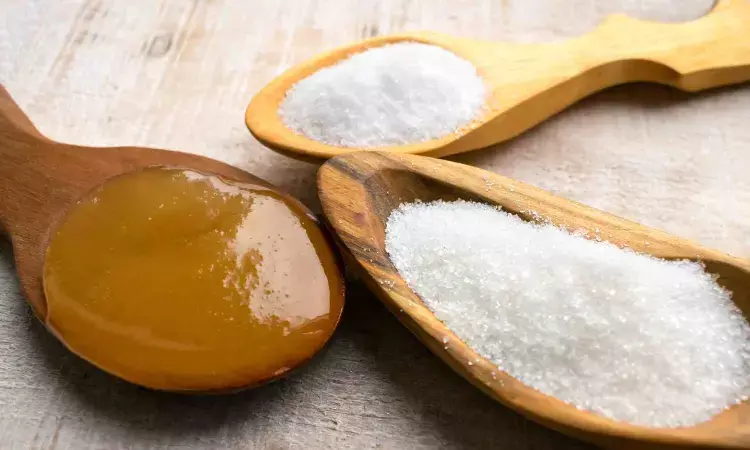- Home
- Medical news & Guidelines
- Anesthesiology
- Cardiology and CTVS
- Critical Care
- Dentistry
- Dermatology
- Diabetes and Endocrinology
- ENT
- Gastroenterology
- Medicine
- Nephrology
- Neurology
- Obstretics-Gynaecology
- Oncology
- Ophthalmology
- Orthopaedics
- Pediatrics-Neonatology
- Psychiatry
- Pulmonology
- Radiology
- Surgery
- Urology
- Laboratory Medicine
- Diet
- Nursing
- Paramedical
- Physiotherapy
- Health news
- Fact Check
- Bone Health Fact Check
- Brain Health Fact Check
- Cancer Related Fact Check
- Child Care Fact Check
- Dental and oral health fact check
- Diabetes and metabolic health fact check
- Diet and Nutrition Fact Check
- Eye and ENT Care Fact Check
- Fitness fact check
- Gut health fact check
- Heart health fact check
- Kidney health fact check
- Medical education fact check
- Men's health fact check
- Respiratory fact check
- Skin and hair care fact check
- Vaccine and Immunization fact check
- Women's health fact check
- AYUSH
- State News
- Andaman and Nicobar Islands
- Andhra Pradesh
- Arunachal Pradesh
- Assam
- Bihar
- Chandigarh
- Chattisgarh
- Dadra and Nagar Haveli
- Daman and Diu
- Delhi
- Goa
- Gujarat
- Haryana
- Himachal Pradesh
- Jammu & Kashmir
- Jharkhand
- Karnataka
- Kerala
- Ladakh
- Lakshadweep
- Madhya Pradesh
- Maharashtra
- Manipur
- Meghalaya
- Mizoram
- Nagaland
- Odisha
- Puducherry
- Punjab
- Rajasthan
- Sikkim
- Tamil Nadu
- Telangana
- Tripura
- Uttar Pradesh
- Uttrakhand
- West Bengal
- Medical Education
- Industry
New generation Artificial sweetener has potential to damage gut, reveals study

New research has discovered that neotame, one of the new generation of artificial sweeteners, is capable of damaging the human intestine and causing illness.
The study is the first to show that neotame can cause previously healthy gut bacteria to become diseased and invade the gut wall-potentially leading to health issues including irritable bowel syndrome and sepsis-and also cause a breakdown of the epithelial barrier, which forms part of the gut wall.
The research, which is published in the journal Frontiers in Nutrition and was carried out at Anglia Ruskin University (ARU), demonstrates that neotame can damage the intestinal epithelium directly, by causing the death of epithelial cells, and indirectly, by damaging bacteria commonly found in the gut.
The in vitro study identified a range of pathogenic responses following exposure of E. coli (Escherichia coli) and E. faecalis (Enterococcus faecalis) to neotame, which is found in drinks, foods and chewing gums, including biofilm formation and increased adhesion to and invasion of cells by diseased bacteria.
Some of the newest artificial sweeteners have a 1,000-fold sweeter taste compared to sugar, reducing the amount needed to be added to food and drink. Despite the smaller quantities used, the impact of neotame on the epithelium-microbiota relationship has the potential to cause poor gut health, which in turn could lead to metabolic and inflammatory diseases such as irritable bowel disease or insulin resistance.
This new research into neotame builds on previous work by Dr Havovi Chichger of Anglia Ruskin University (ARU), which discovered that saccharin, sucralose, and aspartame, some of the most widely used artificial sweeteners, could cause similar damage in the gut.
Artificial sweeteners can play a role in helping with weight loss and aiding individuals with glucose intolerance and type 2 diabetes. However, this new study, led by Dr Aparna Shil, of Jahangirnagar University in Bangladesh, and Dr Chichger highlights the need for further research into the toxic effects of some of the artificial sweeteners that have been developed more recently.
Dr Chichger, Associate Professor in Biomedical Science at Anglia Ruskin University (ARU) and senior author of the study, said: “There is now growing awareness of the health impacts of sweeteners such as saccharin, sucralose and aspartame, with our own previous work demonstrating the problems they can cause to the wall of the intestine and the damage to the ‘good bacteria’ which form in our gut.
“This can lead to a range of potential health issues including diarrhoea, intestinal inflammation, and even infections such as septicaemia if the bacteria were to enter the blood stream. Therefore, it is important to also study sweeteners that have been introduced more recently and our new research demonstrates that neotame causes similar problems, including gut bacteria becoming diseased.
“Understanding the impact of these pathogenic changes occurring in the gut microbiota is vital. Our findings also demonstrate the need to better understand common food additives more widely and the molecular mechanisms underlying potential negative health impacts.”
Reference:
Aparna Shil, Luisa Maria Ladeira Faria, Caray Anne Walker, Havovi Chichger, The artificial sweetener neotame negatively regulates the intestinal epithelium directly through T1R3-signaling and indirectly through pathogenic changes to model gut bacteria, Frontiers in Nutrition, https://doi.org/10.3389/fnut.2024.1366409.
Dr Kamal Kant Kohli-MBBS, DTCD- a chest specialist with more than 30 years of practice and a flair for writing clinical articles, Dr Kamal Kant Kohli joined Medical Dialogues as a Chief Editor of Medical News. Besides writing articles, as an editor, he proofreads and verifies all the medical content published on Medical Dialogues including those coming from journals, studies,medical conferences,guidelines etc. Email: drkohli@medicaldialogues.in. Contact no. 011-43720751


